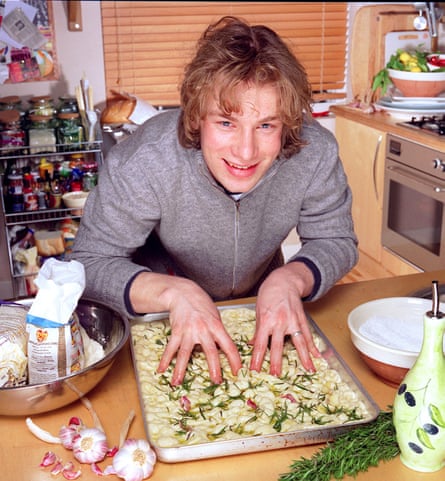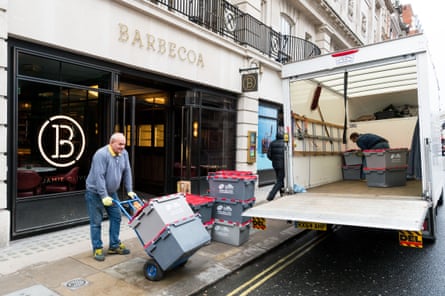‘If you analyse what I’m saying,” says Jamie Oliver, “there’s nothing clever and there’s nothing really that controversial; it’s fucking really basic common sense.”
We meet on the morning that a letter he coordinated has been released, addressed to the prime minister and signed by Jeremy Corbyn, Nicola Sturgeon and other party leaders. It calls on the government to ban junk food advertising before 9pm and unhealthy buy-one-get-one-free offers, among other things. Oliver is proud of it. He looks relaxed, sitting on one of the sofas in his industrial, vintage-styled head office – although he knows the attacks will come. Later, he will be accused on Twitter of being the “fun police”; a column in the Sun will call it a nanny-state initiative that penalises poor people.
“Everyone keeps talking about what’s being taken away,” he says, exasperated. “It’s actually about choice. It’s not saying you can’t get BOGOFs, it’s saying most BOGOFs are shite and would it not be fair to have 50% of your usuals and 50% healthy, because it’s not that at the moment. The mechanisms that function in a supermarket are often driven by the brands that are making money out of high-fat, salt and sugar items.”
He would like improved labelling so people know what they are buying. “People want to get it wrong – I do, too – people want to eat cake, they want to have a burger, but in a way cake and burgers are the most honest food you’ve had in the last 40 years; they’ve never lied to you. But when you go down the cereal aisle and it should really be called the cake aisle [because of the sugar content], that’s what has changed in the last 40 years.” He campaigned successfully for a sugar tax on soft drinks; now, he wants this to be extended to other high-sugar items. He also advocates the compulsory reformulation of foods to reduce calories. “Then you get on to junk-food advertising. We already have protective regulations till 6pm, but kids are watching primetime shows. It’s not inventing new legislation, it’s stretching it to a logical place to protect child health.”
He talks in long, rambling sentences, bristling with energy. His transformation from cheeky-chappy Essex boy chef to single-issue crusader, facts and figures to hand, about to appear in front of a select committee, is complete. You would think he would have enough going on – he closed several of his restaurants recently and restructured his business – but Oliver remains laser-focused on the issue of childhood obesity.

It is not only the food industry that Oliver has targeted. He also champions better nutritional training for GPs and other health professionals, and for workplaces to give breastfeeding mothers more flexible hours. Goodness, is he about to wade into breastfeeding? He grimaces. “I won’t go into breastfeeding, because it’s the most divisive conversation in the world.” But he can’t help himself. “I don’t think anyone should ever say what a woman should do, but I do think they should be loved a lot and given a lot of choices and have lots of resources. If you think the government statutory pay is three weeks, that’s fucking really anti-women, in my opinion.” Statutory maternity pay is actually six weeks at 90% of a woman’s salary (which remains the same or drops to £145.18 a week, whichever is lower, for the next 33 weeks), but Oliver’s point stands: it is among the worst in Europe.
The sugar tax is only one element, he says: “The whole point is, if you look at [the fight against childhood obesity] as a war, which it should be looked at as, it has to be multifaceted – business, home and government. Yes, it will lower consumption. Yes, we will see a turbo charge in reformulation. But the best bit is that it’s the first time the government has put someone on the naughty step and said: ‘There’s a few more of you out there and if you don’t reformulate your products yourself, we’re watching.’”
So far, Oliver seems to be coming at obesity principally as a diet problem, rather than a social one, although it may be too much to ask even someone as energetic and ambitious as him to fix society. Obesity disproportionately affects children in deprived areas. If there is one criticism of Oliver that seems to stand up, it is that he does not entirely understand what it is like to live in relentless, grinding poverty: to be unable to afford fresh vegetables (healthy food is three times more expensive, per calorie, than unhealthy food – Oliver has suggested that the government should subsidise healthy food); to be too tired to cook from scratch every night; to take the financial risk on a lentil recipe that your kids may refuse to eat.
At one point, when we are talking about whether people – working parents, people who have to work several jobs – can be persuaded to turn their backs on the ease of convenience food, he acknowledges that “humans crave convenience, that’s what we’re programmed to do. But convenience food doesn’t have to be shit. The freezer is the future.” But what if you live in a small flat, with a tiny fridge and just an ice box? “Of course, but you can buy it on the defrost – that will be two or three days in the fridge still. You don’t have to have it all racked up in the freezer. But costs are down, welfare is up, waste down. Convenience food doesn’t have to be shite.” But it probably will not be cheap.
“It’s not about five-a-day or couscous,” he says, acknowledging the priorities of people forced to live on very low incomes; it is about eating anything, with health often a secondary consideration. “That’s how bad it is. And it’s bound not to be healthy, and it’s absolutely food banks, and it’s all stuff that is not funded by government. I don’t know how to do it, because I’ve only failed in telling that story so far, but I think what I’m trying to say is the concept of …” He pauses for several seconds. “That really disadvantaged community – the lens they look through is completely different to [that of the middle classes] who have got a clear view.”
Maybe it does not help when he keeps talking about “them” and “us”, as if people on low incomes or benefits are a separate species. But he is not having it. “Yeah, because I don’t have to worry about feeding my kids today and they do. It’s not hard to get someone to say: ‘Jamie Oliver is a wanker.’ I think the concept of having an opinion and caring in Britain is a really funny one, you know: ‘How dare you.’” It is true that he is in an impossible position – as a chef reportedly worth £150m, he is regularly accused of hypocrisy (years on, those lucrative supermarket adverts are used as a stick with which to beat him) and for lecturing the rest of us, but the alternative would be to do nothing. “When I stand up there and start talking, you may or may not like what I say,” he says. “But if you’ve ever seen the people representing the advertising industry or the food industry, I know you would trust me with your kids more than them.”
Why does he do it? There must be times when an easier life – with his wife, Jools, their five children and their lovely £9m home in Hampstead, north London, and his TV cookery shows – seem more appealing. “The important stuff I’ve done I’ve rarely enjoyed,” he says. “I get a beating quite regularly.” So, why carry on? “It just feels like the right thing to do,” he says slowly, enunciating every word.

Does the criticism affect him? He pauses. “Inside, yes, massively. It affects how I switch off at home with my family. I’m not in bits or anything like that, it’s just like a cloud, really. On the outside, no, because I’m fairly tough, but it can be relentless. But I also feel that I’m learning a lot. You can take a lot of battering, and you can [deal with being] uncomfortable and unhappy, if you also have joy in your life. This letter, which has taken a year and a half – that’s a bit of light.” At home, he says, he has “the most incredible wife” and family.
Oliver became political early on. It was only three years after his explosive 1999 debut as the Naked Chef that he was training unemployed young people to staff his restaurant Fifteen – filmed, of course, for a TV series (few can match Oliver’s media skills). His campaign to improve school dinners culminated in the series Jamie’s School Dinners in 2005, while his 2008 series Ministry of Food followed his initiative to teach cookery skills in Rotherham (that project closed last year after Rotherham council stopped funding it, but there are others around the country).
In 2015, Oliver turned his attention to sugar with his documentary Jamie’s Sugar Rush. The month it aired, he says darkly, “stuff changed. Like burglaries, computer systems, break-ins at the office, home.” Before I can ask if he thinks Big Sugar was trying to intimidate him, he continues: “I don’t know, but there’s a string of events since the month that started.” Still, the sugar tax was introduced, under David Cameron’s government (Oliver has been scathing of Theresa May’s childhood obesity strategy).
People have often tried to work out what drives Oliver, but I suspect it is as simple as the satisfaction of seeing results (just like the process of starting with raw ingredients and producing a Sunday roast). “As time has gone on and we’ve got some stuff done, you realise that getting stuff done isn’t that common,” he says. Someone called him a socialist recently and he had to look up the definition. He does not think he is one; he prefers the idea of running a commercial business with a social ethos.
That is not to say everyone agrees he is succeeding. A report in the Times last month portrayed his chief executive Paul Hunt, who is married to Oliver’s sister, as a bully, quoting a former employee who said “morale is at rock bottom”. “It’s complete bollocks,” Oliver says. “You can walk round the business. Like I said to the editor when they ran the story, come in and talk to everyone. If you’re talking about some bad leavers, of course you’re going to find some people who have something to whine about.”
It has been a tough year for Oliver – tougher still for some of his staff. He describes the closure of one of his two Barbecoa steak restaurants and 12 of the 37 UK branches of his chain Jamie’s Italian as “awful. Worst time in my life.” It is the job losses, he says. “We’ve still got 2,000 people, but we’ve had to close 12 restaurants, which is about 800 people.”

Where did it go wrong? He does not acknowledge overexpansion or lack of consistency. “The short story of it is ...” he says, before pausing for a long time. He points out that he has never taken a penny out of the restaurant business (he did, though, pay himself £10m in dividends last year from his licensing and media businesses). “My objective was to start a mid-market dining collection that would disrupt the market and get more British people more value on a plate. We did that quite effectively for five years and I think, from our side, along with cocky landlords, we were cocky in signing leases that were outrageous. We’ve always paid above the minimum wage so, when that changes, that’s more cost. Then we’ve got Brexit, [rising] food costs, the high street slowly dying a death. If you put all that in a box and shake it, that’s where we got to. I went from a board meeting where it was great, bookings were up for Christmas, like-for-likes were good, to the midnight phone call two weeks later going: ‘We’ve run out of cash.’ Awful. And it came down to hours to take [money] from this side of the business to try to save 3,000 jobs. And not fully knowing what was in the laundry basket. I think I’ve done the right thing; I hope in a year I can say I was right, but what is happening out there at the moment is unpredictable.”
He once said he had “fucked up about 40%” of his commercial ventures (he has previously closed his Union Jacks restaurants, his cookery shops and his magazine). “I am human,” he says. “I am susceptible to failure and also I have lots of shortcomings. I’m very emotionally driven and that doesn’t necessarily mean I’m following my heart. I’ve been very impressionable [when it comes to] more experienced, clever people and that’s often made me fail.” Turning 40 (he is now 42) and “having some really world-rocking shocks and worry” has made him re-evaluate himself and the business of being Jamie Oliver.
It can be easy to forget that, amid all the campaigning and the chain-restaurant managing, Oliver is still a wildly popular and successful chef. His most recent book, 5 Ingredients, was one of his biggest-selling and he has another out in the summer. He still writes two recipes every day (about a third are healthy, the rest less so; this is often pointed out as though it is evidence of Oliver’s hypocrisy).
Anyway, he has to go – Hugh Fearnley-Whittingstall, that other anti-obesity campaigner and chef, is on the phone. Oliver says his business is committed to the target of halving childhood obesity by 2030. “That is what you’re going to hear me say for the next 12 years,” he says. You have to admire his single-mindedness. “Don’t get me wrong,” he adds, “I’m fucking looking forward to retiring.”
